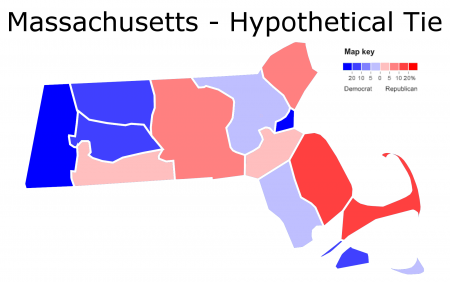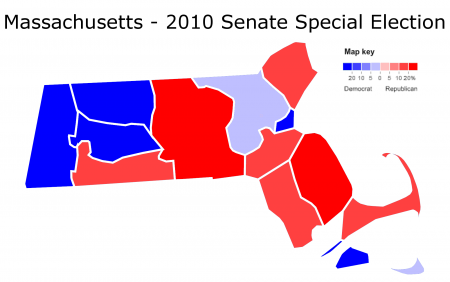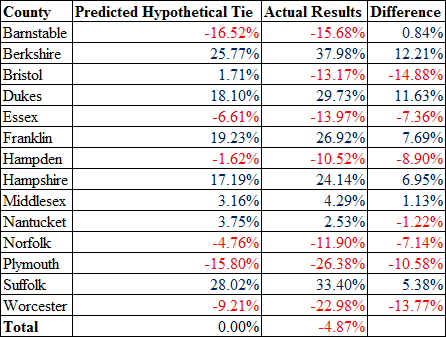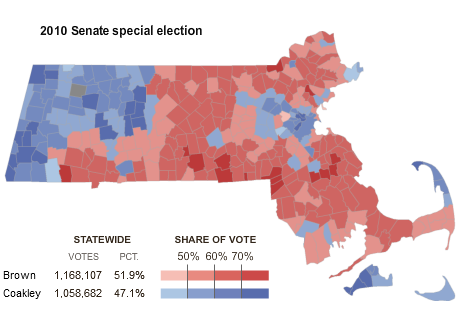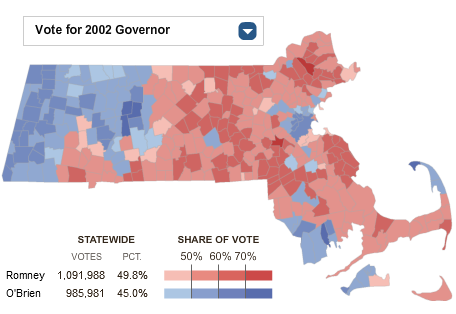• CT-Sen: Democratic Rep. Chris Murphy is sounding very likely to challenge Joe Lieberman in 2012, at least if this WSJ piece primarily on Lieberman’s re-election chances is any indication. It quotes Murphy as “definitely considering” the race and says his decision may be only weeks away, given the nature of permanent campaigning these days. Meanwhile, Paulist economist Peter Schiff (whose rather quixotic bid wound up with him deep in third place in the GOP primary in 2010) is saying he’d like to run for office again, but 2012 won’t be the year, citing the likelihood of a Linda McMahon run and his inability to compete against her money. Finally, Lieberman himself has his mind on his money and his money on his mind, too… he’s hungry enough for money that he’s reaching out to his new friends from the No Labels movement and asking them to consider donating to politicians they don’t necessarily agree with. Interesting argument (especially considering that the No Labels people are probably the likeliest people out there to agree with Lieberman).
• MA-Sen: Long-time Boston mayor Tom Menino has occasionally gotten some coverage as a possible opponent to Scott Brown in the 2012 Senate race, but he’s taking his name out of consideration, saying he’ll never run for anything but even more terms as mayor. Menino also offered some warnings to potential Dem candidates about the race, saying “There’s nobody that can beat him.” (Recall that Menino caught some flak for not really deploying the Boston Dem machine full-force on Martha Coakley’s behalf during the special election, so it’s unclear whether he’s truly fearful of Brown or just engaging in a little concern trolling on Brown’s behalf.)
• MI-Sen: Here’s another indicator (after last month’s PPP poll that had her mired in the 40s) that Debbie Stabenow could have a tough race in 2012, given the right GOP opponent. A Glengariff Group poll for the Detroit News doesn’t include any head-to-heads, but gives her 37/39 approvals, and a 23% definite re-elect (vs. 43% someone new). Of course, the GOP will need to cough up someone more imposing than Tim Leuliette, the only publicly interested candidate so far.
• MN-Sen: I hadn’t heard Rep. John Kline (the GOP Rep. in MN-02, who labors in right-wing anonymity thanks to a lot of cover from noisy neighbor Michele Bachmann) get associated with the 2012 Senate race before, and after today, he probably won’t again. He told a talk radio interview over the weekend that his “plate was full.”
• MT-Sen: There’s been an uptick in speculation that Denny Rehberg may not run for Senate after all, given that he just landed a slot as not just one of the Appropriations cardinals (regarded by Beltway insiders as the uppermost tier in the House pantheon) but the subcommittee chair in charge of HHS, letting him carry the banner on any HCR repeal efforts. However, he’s still being coy about his 2012 plans (and in fact getting a little meta about the endless Beltway media parsing of political career planning), saying a decision is “down the road… which is similar to around the corner.”
• NE-Sen: This has been pretty clearly telegraphed for a while now, but Republican state treasurer Don Stenberg is saying he’s “quite likely” to get into the Senate race. That, of course, would set up a high-profile primary with another statewide GOPer already a formal candidate, AG Jon Bruning. Meanwhile, GOP state party chair Mark Fahnelson removed an image from his personal blog of Ben Nelson inside a red bullseye. In good Republican fashion, he reaffirmed that he himself, in fact, was the victim in all this.
• NV-Sen: Hoping for Sue Lowden to be the 2012 Senate nominee for the GOP? Don’t count your chickens before they hatch, because she’s saying she won’t consider running if Dean Heller is going to run (she would do it only if both John Ensign and Heller didn’t run). Rather candidly, she admitted that she had no shot of beating Heller in a GOP primary. Meanwhile, Sharron Angle has decided that, having had a shot at the big time, another run for the state Senate would just be chicken feed at this point. She says that she won’t seek the seat being vacated by resigning former GOP floor leader Bill Raggio (to whom she lost in a 2008 primary), although without saying anything more about another NV-Sen run or a NV-02 run if Heller runs for Senate.
• TX-Sen: Here’s another poll showing a Senator who may have a rough go of it in 2012, although in Kay Bailey Hutchison’s case, the real hurdle is likely to be the GOP primary. A Blum & Weprin poll for various Texas newspapers found Hutchison with a 46% approval among all registered voters, and only 56% among Republicans. Hutchison, of course, has not given any indication whether she’s running for another term or not.
• LA-Gov: That gubernatorial election is only 10 months away, and Louisiana Democrats still seem to standing around scratching their heads wondering who their nominee will be. With GOP incumbent Bobby “Kenneth the Page” Jindal sitting on a $7.2 million war chest and, while not super-humanly popular anymore, still in positive territory, willing victims do not seem forthcoming. Dems seem most interested in somebody who can self-finance, which would probably be oft-rumored Shaw Group CEO Jim Bernhard, although other more remote possibilities include losing Lt. Gov. candidate Caroline Fayard, PSC Commissioner Foster Campbell (who finished 3rd in the 2007 primary), retired Gen. Russell Honore (who was briefly the subject of speculation for a GOP primary challenge to David Vitter last year), and even a return engagement from ex-Gov. Kathleen Blanco.
• AZ-08: Best wishes to Gabby Giffords for what will no doubt be a long, slow recovery after this weekend’s shooting. Physicians say that she is rapidly improving and may be removed from her breathing apparatus in several days if progress continues.
• ND-AL: This has implications for North Dakota’s House seat, but also potentially for the Senate seat in 2012, if Kent Conrad (last seen ramping up to start advertising already) does a sudden turnaround and opts for retirement. Ex-Rep. Earl Pomeroy (who’s 58) is joining DC law firm Alston & Bird and says “I don’t see myself running for office again.”
• NM-02: Similarly, Harry Teague has announced that he won’t run again for his old seat or anything else, saying he has no plans to seek another office. The 61-year-old (and independently wealthy) Teague plans to return to his family oilfield business.
• Mayors: Another day, another poll showing Rahm Emanuel way in the lead (albeit not out of runoff territory yet). This one’s from Anzalone-Liszt on behalf of the Teamsters, and while it shows Carol Mosely Braun gaining ground (thanks to dropouts from Danny Davis and James Meeks), she’s still far behind. It’s Emanuel 42, Mosely Braun 26, Gerry Chico 10, and Miguel Del Valle 7. (November’s Teamster poll was Emanuel 36, Mosely Braun 13, Chico 10.) Meanwhile, Chico can now boast an endorsement from Rep. Luis Gutierrez, which seems like a bit of a thumbed-nose at Emanuel (who used to be Gutierrez’s neighbor in the House). And on the other side of the country, San Francisco has a newly-minted interim mayor: city administrator Ed Lee, who will fill in for the next 10 months as Gavin Newsom becomes Lt. Governor. The main thing that clinched it for Lee (who will be the city’s first Asian-American mayor) was his promise not to run for the job in the November election. One of Newsom’s last acts was to appoint a new DA in San Francisco, too (to replace the state’s new AG, Kamala Harris): he promoted police chief George Gascon to that job.
• WATN?: Where are they now? On the prison bus, that’s where. At least that’s the case with former Republican House majority leader Tom DeLay, just sentenced this morning to three years on conspiracy charges associated with laundering corporate money into campaign donations.







